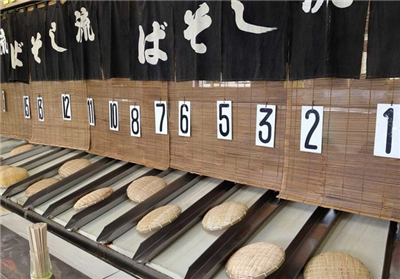Japan has a unique culture with a very strict code of etiquette.
日本有著獨特的文化和嚴格的禮儀。
]There are specific ways to eat noodles, good practices for accepting gifts, and certain rules to follow to avoid insulting a host.
吃面條也有著特殊的方法,收禮物也要有好的方式,更別說要遵守一些規則避免侮辱招待你的人了。
This complex web of social rules and traditions can be overwhelming for those traveling to Japan, so we compiled a list of some of the things foreigners find most shocking when visiting the country.
這個復雜的社會規則和傳統網可能會讓一些剛來日本的人覺得倍受打擊,所以我們制作了一個的表單囊括了那些會讓外國人震驚的規則。
Here are 11 customs you should know before traveling to Japan.
這里是你去日本旅行之前需要知道的11項習俗。
1. No. 4 is avoided at all cost.

In Japan, the number "four" is avoided because it sounds very similar to the word for death. In the same vein as No. 13 in Western culture, No. 4 is extremely unlucky and is used as little as possible. You must always avoid giving anyone something in fours because it can be seen as a very ominous gift.
在日本,數字"4"因為聽起來像"死"字所以被盡量避免。就像西方文化避免數字"13"一樣,"4"代表著極端的不幸。你必須避免給別人"4"樣的東西,因為它是不詳的禮物,
Elevator labels will often be missing a fourth floor — and in extreme cases, they will not have floors 40 to 49. No. 49 is especially unlucky, as it sounds similar to the phrase that means "pain until death."
電梯標簽經常會刻意忽略第4層,在極端的情況下,樓內不會有40到49的樓層。而49被認為是特別不幸運的,因為它聽起來像"痛苦至死"。
The practice of avoiding No. 4 is called "Tetraphobia," and it is common in many East Asian and Southeast Asian regions.
避免"4"的習俗被稱為"四的禁忌",這在很多東亞和東南亞地區十分常見。
2. Blowing your nose in public is considered rude.
在公共場所擤鼻子是十分粗魯的行為。
Blowing your nose in public is seen as not only rude, but simply disgusting. Instead people will general ly sniffle until they find somewhere private. If you simply must blow your nose, it is recommended that y ou do so as discreetly as possible.
在公共場所擤鼻子不但會被認為十分粗魯,還會讓人覺得十分惡心。通常人們會吸著鼻涕直到找到一個私密的地方。如果你必須要擤鼻子,建議你做得越小心越好。
The Japanese are also repelled by the idea of a handkerchief.
曰本人也很抗拒手帕這種東西。












